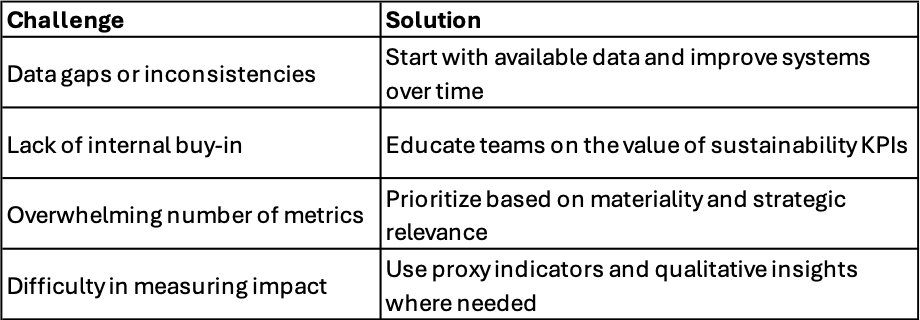By Sustainability Core Advisors
In today’s business environment, sustainability is no longer a “nice-to-have”—it’s a strategic imperative. Companies across industries are being held accountable not only for their financial performance but also for their environmental and social impact. To navigate this shift effectively, organizations must track their progress using Sustainability Key Performance Indicators (KPIs).
But what exactly should you measure? And why do these metrics matter so much?
Let’s look at the most important sustainability KPIs, how to choose the right ones for your organization, and how they drive meaningful change.
What Are Sustainability KPIs?
Sustainability KPIs are quantifiable metrics that help organizations monitor, evaluate, and improve their environmental, social, and governance (ESG) performance. These indicators provide a framework for setting goals, tracking progress, and communicating impact to stakeholders.
They typically fall into three categories:
- Environmental KPIs – Focused on resource use, emissions, waste, and biodiversity.
- Social KPIs – Related to employee well-being, community engagement, and human rights.
- Governance KPIs – Concerned with ethical leadership, transparency, and compliance.
Why Sustainability KPIs Matter
- Strategic Decision-Making
KPIs provide data-driven insights that help leaders make informed decisions about operations, investments, and risk management.
- Regulatory Compliance
Governments and regulatory bodies are increasingly mandating ESG disclosures. KPIs ensure your organization meets these requirements.
- Stakeholder Trust
Investors, customers, and employees want transparency. KPIs demonstrate accountability and build credibility.
- Operational Efficiency
Tracking sustainability metrics often reveals inefficiencies—leading to cost savings and process improvements.
- Competitive Advantage
Companies with strong sustainability performance often outperform peers in brand reputation, talent acquisition, and long-term resilience.
Core Sustainability KPIs to Track
Here’s a breakdown of essential KPIs across the ESG spectrum:
Environmental KPIs
- Carbon Footprint (CO₂ Emissions)
- Measures total greenhouse gas emissions from operations, supply chain, and products.
- Helps identify high-impact areas and set reduction targets.
- Energy Consumption
- Tracks energy use across facilities, transportation, and production.
- Can be broken down by renewable vs. non-renewable sources.
- Water Usage
- Monitors water consumption and efficiency.
- Critical for industries with high water dependency (e.g., agriculture, manufacturing).
- Waste Generation and Diversion
- Measures total waste produced and percentage diverted from landfills (recycled, composted, reused).
- Supports zero-waste initiatives.
- Sustainable Procurement
- Tracks percentage of suppliers meeting sustainability criteria.
- Encourages responsible sourcing and supply chain transparency.
Social KPIs
- Employee Engagement and Satisfaction
- Gauged through surveys, retention rates, and feedback.
- Reflects workplace culture and well-being.
- Diversity, Equity, and Inclusion (DEI) Metrics
- Measures representation across gender, ethnicity, age, and other dimensions.
- Supports inclusive hiring and promotion practices.
- Health and Safety Incidents
- Tracks workplace injuries, illnesses, and near misses.
- Indicates commitment to employee welfare.
- Community Investment
- Quantifies contributions to local communities (volunteering hours, donations, partnerships).
- Enhances social license to operate.
- Training and Development
- Measures hours or percentage of employees receiving sustainability-related training.
- Builds internal capacity for sustainable practices.
Governance KPIs
- Board Diversity
- Tracks diversity in leadership roles.
- Promotes inclusive decision-making.
- Ethical Compliance
- Measures adherence to codes of conduct, anti-corruption policies, and regulatory standards.
- Reduces legal and reputational risks.
- ESG Disclosure Quality
- Assesses transparency and completeness of sustainability reporting.
Aligns with frameworks like GRI (Global Reporting Initiative), SASB (Sustainability Accounting Standards Board), or TCFD (Task Force on Climate-related Financial Disclosures).
- Risk Management Integration
- Evaluates how sustainability risks (climate, social unrest, etc.) are embedded in enterprise risk management.
- Enhances resilience.
- Stakeholder Engagement
- Tracks frequency and quality of engagement with investors, customers, employees, and communities.
- Builds trust and responsiveness.
How to Choose the Right KPIs
Not all KPIs are relevant to every organization. Here’s how to tailor your metrics:
- Align with Business Goals
Choose KPIs that support your strategic objectives—whether it’s reducing emissions, improving employee retention, or enhancing transparency.
- Consider Materiality
Focus on issues that are most significant to your industry and stakeholders. Conduct a materiality assessment to identify priorities.
- Use Recognized Frameworks
Leverage standards such as:
- GRI (Global Reporting Initiative)
- SASB (Sustainability Accounting Standards Board)
- TCFD (Task Force on Climate-related Financial Disclosures)
- UN SDGs (Sustainable Development Goals)
- Ensure Measurability
Choose KPIs with reliable data sources and clear definitions. Avoid vague or subjective metrics.
- Balance Short-Term and Long-Term
Include both operational metrics (e.g., energy use) and strategic indicators (e.g., climate risk integration).
Tracking and Reporting Best Practices
- Automate Data Collection: Use software tools to streamline tracking and reduce errors.
- Set Benchmarks and Targets: Compare performance against industry standards and set realistic goals.
- Visualize Progress: Use dashboards and infographics to make data accessible and engaging.
- Report Regularly: Publish updates in annual sustainability reports, websites, or stakeholder communications.
- Audit and Verify: Ensure data accuracy through third-party verification or internal audits.
Common Challenges and How to Overcome Them

Turning Metrics into Meaningful Action
Sustainability KPIs are more than just numbers—they’re tools for transformation. By measuring what matters, organizations can move from intention to impact, building a future that’s not only profitable but also responsible and resilient.
Establishing the right KPIs for a business based on its strategic goals, sustainability goals, and unique operating characteristics and preferences is one of the many services provided by Sustainability Core Advisors, fractional sustainability consultants.
Whether you’re just starting your sustainability journey or refining an existing strategy, choosing the right KPIs is a critical step. They help you stay accountable, improve performance, and tell a compelling story of progress.
